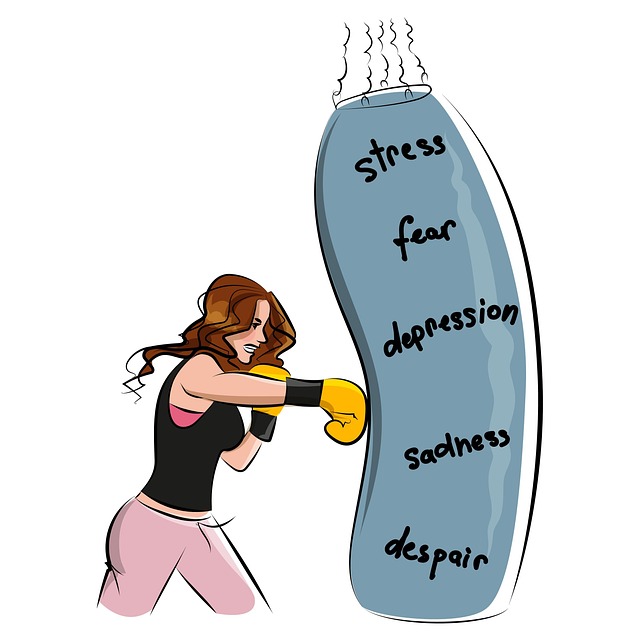Substance abuse is a complex issue with severe consequences, but Englewood Biofeedback Therapy offers a holistic solution. This innovative approach combines relaxation techniques and self-regulation tools to address root causes like low self-esteem and stress reduction. Through real-time sensor feedback, clients learn to recognize and alter stress patterns, promoting better mental wellness. The program includes journaling, exercise guidance, and comprehensive strategies to reduce substance abuse risks by teaching individuals to manage their physiological responses and develop healthier coping mechanisms. Support groups and community engagement further enhance recovery, making Englewood Biofeedback Therapy a critical step towards mitigating substance abuse and fostering lasting recovery.
Substance abuse poses significant risks, impacting physical and mental health, relationships, and overall well-being. Understanding these dangers is the first step towards recovery. This article explores comprehensive risk reduction strategies, from recognizing substance abuse issues to implementing effective solutions like Englewood Biofeedback Therapy. We delve into lifestyle changes, the power of community support, and the importance of professional guidance for a successful journey towards overcoming addiction.
- Understanding Substance Abuse and Its Risks
- The Role of Englewood Biofeedback Therapy
- Lifestyle Changes for Risk Mitigation
- Support Groups and Community Engagement
- Professional Help and Ongoing Recovery Strategies
Understanding Substance Abuse and Its Risks

Substance abuse is a complex issue that involves the harmful use of drugs or alcohol, leading to negative consequences for individuals and society at large. It’s crucial to understand that this isn’t merely a personal choice but a condition with profound physical, mental, and social implications. The risks associated with substance abuse are multifaceted, encompassing health complications, legal entanglements, strained relationships, and potential addiction. According to studies, Englewood Biofeedback Therapy has emerged as a promising approach, offering a unique blend of relaxation techniques and self-regulation tools that can aid in managing cravings and triggers.
This therapeutic method goes beyond traditional treatments by addressing the root causes, such as low self-esteem and stress reduction methods, which are often at the heart of substance abuse. By integrating practices like mindfulness and biofeedback, Englewood Biofeedback Therapy not only facilitates depression prevention but also empowers individuals to regain control over their lives. Such holistic approaches hold significant potential in breaking the cycle of addiction, emphasizing that comprehensive understanding and tailored strategies are key to risk reduction.
The Role of Englewood Biofeedback Therapy

Englewood Biofeedback Therapy offers a powerful tool in the arsenal against substance abuse. By focusing on physiological responses and teaching individuals to regulate them, this therapy empowers people to gain control over their impulses and cravings. Through the use of real-time feedback from sensors, clients learn to identify and modify stress patterns, leading to better mental wellness. Journaling and exercise guidance often accompany biofeedback sessions, fostering a holistic approach that combines physical regulation with emotional awareness and self-care routine development for better mental health. This comprehensive strategy not only aids in reducing substance abuse risks but also boosts confidence in managing personal well-being.
Lifestyle Changes for Risk Mitigation

Englewood Biofeedback Therapy offers a powerful tool for individuals seeking to reduce risks associated with substance abuse. Through this therapy, clients learn to manage stress and regulate their emotions using physiological feedback from their bodies. By understanding mind-body connections, individuals can develop healthier coping mechanisms, which are essential in mitigating the triggers that lead to substance misuse.
Incorporating self-care practices is another effective strategy for risk reduction. This includes adopting a balanced lifestyle with regular exercise, nutritious meals, and adequate sleep—all of which contribute to improved mental health. Mental Health Education Programs Design tailored to address substance abuse can equip individuals with knowledge about addiction’s psychological underpinnings, fostering a sense of empowerment to make positive choices and avoid relapse. Combining these approaches—Englewood Biofeedback Therapy, self-care, and education—can significantly enhance an individual’s ability to manage their well-being and reduce the risk of substance abuse.
Support Groups and Community Engagement

Support groups and community engagement play a pivotal role in substance abuse risk reduction strategies. These platforms offer individuals a safe space to share experiences, gain insights from peers, and build a support network free from judgment. For those seeking holistic healing, Englewood Biofeedback Therapy can be a game-changer. This therapy combines traditional talk therapy with biofeedback techniques, fostering self-awareness and empowering individuals to manage triggers effectively.
Community engagement also facilitates the adoption of conflict resolution techniques and boosts confidence, essential elements in maintaining sobriety. By participating in support groups, individuals learn valuable negotiation skills to navigate challenges and high-risk situations, enhancing their ability to make informed decisions. This collective approach not only supports individual recovery but contributes to a broader mental health risk assessment for professionals working with vulnerable populations.
Professional Help and Ongoing Recovery Strategies

Seeking professional help is a pivotal step in mitigating substance abuse and fostering lasting recovery. Englewood Biofeedback Therapy offers a unique approach to address underlying issues by teaching individuals how to regulate their physiological responses, which can be particularly effective for managing stress and cravings. This evidence-based method empowers clients to take control of their mental and physical well-being.
In conjunction with therapy, establishing a robust self-care routine is essential for sustaining recovery. Encouraging activities that promote holistic health, such as regular exercise, mindfulness practices, and social connections, can significantly reduce the risk of relapse. Moreover, initiatives aimed at Mental Illness Stigma Reduction Efforts play a crucial role in fostering an environment where individuals feel supported and empowered to seek help without fear of judgment. Combining professional interventions with personal self-care strategies creates a comprehensive framework for long-term substance abuse prevention and recovery.
Substance abuse poses significant risks, but understanding and implementing effective strategies can significantly reduce these dangers. From recognizing signs early on to adopting lifestyle changes and engaging with support groups, each step plays a crucial role in mitigating harm. Specifically, Englewood Biofeedback Therapy offers a powerful tool for managing cravings and stress, making it an integral part of any comprehensive risk reduction plan. Ultimately, combining professional help with ongoing recovery strategies ensures a stronger path to long-term well-being and reduced substance abuse risks.














